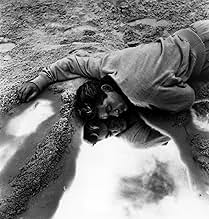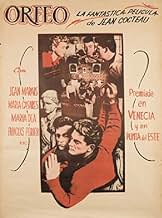ÉVALUATION IMDb
7,9/10
14 k
MA NOTE
Un poète fasciné par la Mort suit sa femme malheureuse, jusqu'aux enfers.Un poète fasciné par la Mort suit sa femme malheureuse, jusqu'aux enfers.Un poète fasciné par la Mort suit sa femme malheureuse, jusqu'aux enfers.
- Nominé pour le prix 1 BAFTA Award
- 2 nominations au total
André Carnège
- Judge
- (as Maurice Carnège)
Paul Amiot
- Judge
- (uncredited)
Philippe Bordier
- Young Man at Café des Poètes
- (uncredited)
Claude Borelli
- Une bacchante
- (uncredited)
Jean Cocteau
- Narrator
- (voice)
- (uncredited)
Histoire
Le saviez-vous
- AnecdotesThe opening scenes set in the Cafe des Poetes were originally set to be filmed with regular extras. However, Cocteau found them to be too self-conscious and artificial so they were all dismissed. Instead, real bohemians from Paris' real café culture were drafted in. These proved to be so natural and relaxed with the café setting, they actually stayed on for two extra days after filming had finished, just hanging out in the cafés that the film crew had been using.
- GaffesWhen Orphée is shot, the gun falls near his right foot. However when Heurtebise picks up the gun; the orientation changes and it is now near his right hand.
- Citations
Heurtebise: I am letting you into the secret of all secrets, mirrors are gates through which death comes and goes. Moreover if you see your whole life in a mirror you will see death at work as you see bees behind the glass in a hive.
- ConnexionsEdited into Histoire(s) du cinéma: Une histoire seule (1989)
- Bandes originalesDance of the Blessed Souls -- from Orphée et Eurydice
Written by Christoph Willibald Gluck
Commentaire en vedette
This is my favorite Cocteau film and the most accessible of the Orpheus trilogy, which includes Blood of the Poet (1930) and The Testament of Orpheus (1960). It tells the story of a poet's love for both his wife and "The Princess", a shadowy figure who conducts humans to the underworld upon their death. Orpheus is obsessed with the figure of Death and, ignoring his pregnant wife, follows her into the underworld. The Princess, in turn, falls in love with Orpheus, conducts Orpheus's wife into the underworld, and is eventually punished for "breaking the rules". The underworld is portrayed as a bureaucracy where drab clerks hold hearings in small drab rooms and bring down the wrath of the "rules" on anyone who does not play out their specified role.
Maria Casares is superb as the Princess but François Périer is my favorite character, Heurtebise, the Princesses assistant who also "breaks the rules" by falling in love with Orpheus' wife. Jean Marais is also excellent as the poet Orpheus. Cocteau comments on the role of the poet in society through the role of Orpheus. The young avant garde crowd has turned against Orpheus and now worships the vacant Cegeste. Orpheus asks his publisher what he must do to regain their admiration and is told to "astonish us". When the police inspector is about to arrest Orpheus and then, upon recognizing him, lets him off and asks for his autograph, you know we're not in Kansas (or anywhere in the US).
Several of the characters (The Princess, Heurtebise and Cegeste), played by the same actors, repeat their roles 10 years later in The Testament of Orpheus, passing judgement on Cocteau himself. Their scenes are the best part of that film.
This is a very beautiful film that I've grown to like more and more upon repeat viewings. 9 out of 10.
Maria Casares is superb as the Princess but François Périer is my favorite character, Heurtebise, the Princesses assistant who also "breaks the rules" by falling in love with Orpheus' wife. Jean Marais is also excellent as the poet Orpheus. Cocteau comments on the role of the poet in society through the role of Orpheus. The young avant garde crowd has turned against Orpheus and now worships the vacant Cegeste. Orpheus asks his publisher what he must do to regain their admiration and is told to "astonish us". When the police inspector is about to arrest Orpheus and then, upon recognizing him, lets him off and asks for his autograph, you know we're not in Kansas (or anywhere in the US).
Several of the characters (The Princess, Heurtebise and Cegeste), played by the same actors, repeat their roles 10 years later in The Testament of Orpheus, passing judgement on Cocteau himself. Their scenes are the best part of that film.
This is a very beautiful film that I've grown to like more and more upon repeat viewings. 9 out of 10.
- gkbazalo
- 19 août 2004
- Lien permanent
Meilleurs choix
Connectez-vous pour évaluer et surveiller les recommandations personnalisées
- How long is Orpheus?Propulsé par Alexa
Détails
- Durée1 heure 52 minutes
- Couleur
- Rapport de forme
- 1.37 : 1
Contribuer à cette page
Suggérer une modification ou ajouter du contenu manquant

































